Our wilderness farm was a fabulous place to grow up. No one told us we were poor. It wouldn’t have mattered anyway.
We spent most of our waking hours outside when not in school, playing or doing chores. We’d go inside, reluctantly, for meals and at night, or when it was raining in summer or too cold in winter.
In the evenings, my sisters and I huddled around the light of a dim kerosene lamp to do our homework, and play cards and endless board games, on a heavy kitchen table covered by a white oilcloth with tiny floral patterns.
That kitchen was the social center in our home. Its most dominant feature was an enormous cast iron cook stove… rarely cool for long periods, and never during the day. That black and steel monster had an insatiable appetite for firewood, especially in winter when it was the primary heat source for our lightly insulated two-story clapboard home. 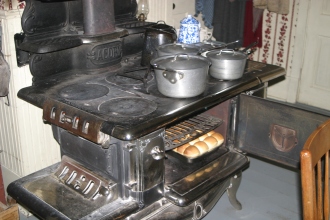
It’s unthinkable today, but we didn’t miss being without a telephone, or running water, or even sewer. Our parents improvised to provide whatever we needed, just as the other families did in the area.
Water came from a rusty iron pump on one side of the back yard. Dad had to climb down into the 40-foot well one day to find out why the valve at the bottom seemed plugged. The rotting wood ladder nailed to the inside of the well prompted a bout of handwringing by Mom until Dad re-emerged with the problem solved: a mouse had had the nerve to fall into the well and clog the valve with its body.
A vital part of our bathroom was a tall narrow structure of weathered wood that guarded one end of a long path ending on the far side of our garage. 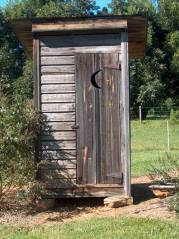 It was a one-holer equipped with a Sears catalog for use both as reading material and for when the regular toilet paper ran out, as it often did. The other component was a big galvanized tub everyone used on Saturday night, starting with the youngest. Poor Dad.
It was a one-holer equipped with a Sears catalog for use both as reading material and for when the regular toilet paper ran out, as it often did. The other component was a big galvanized tub everyone used on Saturday night, starting with the youngest. Poor Dad.
We did have a window to the outside world, although we weren’t aware we needed one. It was a battery-powered mantle radio perched on a corner shelf, in the kitchen of course. To conserve the battery, Mom or Dad would turn it on for an hour or two in the evening, once or twice a week and always on Sunday evenings. 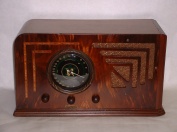 Our imaginations soared as we listened to the earliest episodes of Batman, and to classics like The Lone Ranger, or to Lux Radio Theatre, a precursor to PBS shows like Masterpiece Theatre.
Our imaginations soared as we listened to the earliest episodes of Batman, and to classics like The Lone Ranger, or to Lux Radio Theatre, a precursor to PBS shows like Masterpiece Theatre.
Sure, in retrospect, our life was quite primitive but we loved every minute of it!
Summer days were awesome! When not busy with chores we had a wide variety of interesting things to choose from. Among these:
- Adding floors to our tree house built high up in a clump of Aspen in the cow pasture,
- Work on the creaky raft that we sailed on a pond behind the outhouse (yes! amazing we didn’t drown, or worse),
- Picking wild strawberries or blueberries and savoring their intensely distinctive flavors,
- Swimming in a shallow pond formed by a burned out patch of moss (muskeg) on one corner of our farm,
- Laying on our backs in the garden, chomping on freshly pulled baby carrots while watching clouds swirl and dance above us. We were supposed to be weeding.
- Exploring the unspoiled beauty of the forests of evergreen and Aspen trees surrounding our small farm.
 Often we would flush out flocks of partridge or be terrified when aggressive ruffled grouse rushed at us while protecting their nests,
Often we would flush out flocks of partridge or be terrified when aggressive ruffled grouse rushed at us while protecting their nests, - Climbing tall slender Aspen and swinging from one to another 10 or even 20 feet up (no, there were no nets or special landing pads).
City kids who came to visit thought it really cool to help with the chores. We let them think so, and encouraged them to take our place to:
- Fork hay for the cows and horses,
- Spread grain for the chickens and turkeys,
- Feed our calves and pigs a mixture of skim milk and chopped grain.
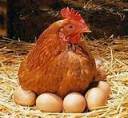
- Turn the handle on a machine used to separate the milk that came from our dozen cows into skim milk and cream, the latter an important source of cash.
- Gather eggs from the chickens, then wash and count them
- Draw water from the hand pump in buckets and haul it to the troughs for the cows, horses and pigs.
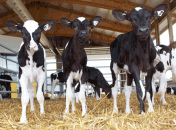
None of our visitors were quite as keen to help clean cow manure from the barn. Instead they’d go searching for newborn kittens in the hayloft.
And those starry eyed visitors, mostly cousins, would line up to try their hands at milking a 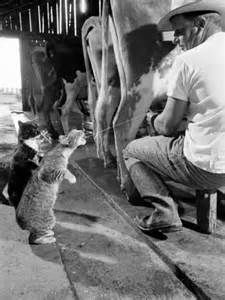 cow. The big attraction was learning how to squirt milk from a cow’s teat to kittens lined up in the barn aisle, their mouths open wide in anticipation.
cow. The big attraction was learning how to squirt milk from a cow’s teat to kittens lined up in the barn aisle, their mouths open wide in anticipation.
Mercifully, our cousins lost interest quickly in another chore – chopping wood to feed the never-ending appetite of that big old cast iron kitchen stove. Good thing, though. A few of the visitors sometimes came closer with the axe to their legs and feet than to the wood they were supposed to be chopping.
For us, these chores weren’t quite so cool. We had to do these every day. The chores were aptly named. Full disclosure: our parents did far more of these chores, and others, than we ever thought of doing, but we complained a lot more.
Another chore was weeding our humungous garden in summer. The job seemed to never end. Our parents planted a full acre or more in vegetables. We understood those veggies were a key part of our diet from mid-summer until they were all used up by the following spring. Our job included watering the long rows of vegetable plants by hand – no running water, remember? 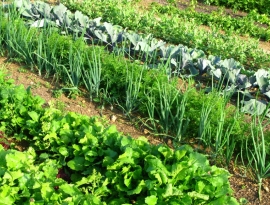 Buckets of water came from that infamous pond and that hand-operated cast iron pump, the source of potable water for the entire farm.
Buckets of water came from that infamous pond and that hand-operated cast iron pump, the source of potable water for the entire farm.
Admittedly, thinning the rows of veggies and battling the weeds had its bright side: fresh tiny carrots thinned from the rows were scrumptious once wiped clean on your pants or shirt, as were fledgling radishes, and juicy little green peas squeezed from fresh pods… delicious. But raw green beans and lima beans were understandably unattractive, as were lettuce, corn, turnips and the hills of potatoes that generated more potato bugs than you could possibly imagine. With thumb and forefinger we turned them into fertilizer. We tried to remember to not lick our fingers!
Another ‘glass half-full’ chore was that shoveling of manure from the barn… a smelly, dirty job to be sure. It was the presence in the barn of the newborn calves and kittens that made the job worthwhile. It was a challenge to keep from being distracted. There was yet another positive role for that lowly manure. Dad used it to fertilize our fields of oats and barley that fed the calves, horses, pigs, chickens and turkeys… that of course fed us.
Summers were intense and far too short.The return of fall also meant a return to school. What stung the most was the loss of freedom, but the upside was spending time with other kids. The nearest boy my age was a two-mile walk away.
Winter was more challenging in retrospect than it seemed at the time.
Before going to bed in winter, our parents would stoke the kitchen stove and the small pot-bellied stove in the living room with coal heaped on top of hot wood embers. These smoldered all night keeping the stoves warm for a while. They were cold by morning. Many winter mornings, the water in a chipped enamel washbasin on a stand next to my bedroom would have a thick coating of ice. Sometimes the temperatures outside dropped to 40 below F, occasionally even lower.
Our two stoves yielded a byproduct: ashes. Removing them was my job. Occasionally, I’d take them outside while some were still hot. One night while dumping them during a blizzard a red-hot coal sought a home down the top of my laced up leather boot. I’ve no idea how I managed to kick off that boot so quickly.
History abounds with stories about walks to school in winter. Suffice to say that our father instructed my sisters and I how to keep from getting lost in a blizzard while en route to and from our one-room school.  We were told that when faced with deep swirling snow, one of us must hold onto the top of a fence post, while holding hands with the others, until one of us could spot the next post, usually eight or ten feet away. Some blizzards made it difficult to see the tops of the posts poking up through the deep snow.
We were told that when faced with deep swirling snow, one of us must hold onto the top of a fence post, while holding hands with the others, until one of us could spot the next post, usually eight or ten feet away. Some blizzards made it difficult to see the tops of the posts poking up through the deep snow.
Almost every challenge in farm life can have a positive side, if you allow it. Those blizzards were no exception. Snow driven by the howling winds drifted into a creek valley next to our school, filling one side with hard-packed snow. Those drifts quickly became skillfully crafted caves, the products of the creative future builders among us 15 to 20 pupils distributed across grades one to eight.
The snow in winter also made it easier for Dad to collect firewood, fence rails and fence posts. That’s where our two big horses came in. 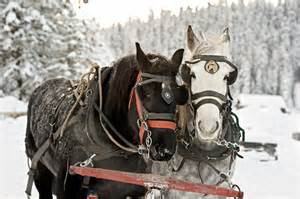 That team could pull a double-bunk sleigh through deep snow in the woods where our big tractor couldn’t begin to navigate. Their hooves, the size of large pie plates, acted like snowshoes on the five or six feet of snow.
That team could pull a double-bunk sleigh through deep snow in the woods where our big tractor couldn’t begin to navigate. Their hooves, the size of large pie plates, acted like snowshoes on the five or six feet of snow.
My older sister and I loved to go with Dad on those excursions. He’d cut standing trees already dead to be used as firewood. And he’d cut tall thin live trees called Tamarack (aka, Larch) for fence posts and rails. We learned that Tamarack is more resistant to rot than others. One summer, my sister and I were exploring the bush when we came upon one location where Dad had been cutting trees the previous winter. The stumps had been level with the snow height then. Now they were higher than either of us could reach. Deep snow.
In a way best understood by farm kids, my bike represented another positive byproduct of a potential negative. One fall day my friend arrived at school with a new bike. I was envious. After intense pestering, my parents promised a bike, on one condition. If I kept a newborn runt pig alive so it could grow to marketable size, the money we got for it would go toward a bike. One glance into the maternity pen made it clear the runt was too small to compete with his dozen or so siblings for his mother’s teats. It would have starved to death unless given personal attention.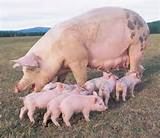
Mom fitted a nipple onto an Orange Crush bottle filled with cow’s milk. At first that little guy tried to run away. When caught, he squealed so loud his mother raised her head in alarm. A danger sign! Mother pigs defending their young can be extremely dangerous.
It took a couple of days until the runt realized I was his food bank. Soon he came running the second he saw me. I fed him two or three times a day for weeks, sitting with that little guy on my lap. In hindsight, he looked like Piglet from Winnie-The-Pooh. I was surprised to discover he had a sweet smell, much like a newborn baby! Yes! Really! Well, that is, until he grew big enough to run outside and play in the mud holes with his dozen or so siblings. One day, off he went to market with the others and, voila! My shiny new red and white Road King bicycle appeared shortly thereafter.
Don’t let anyone tell you recycling is new. Back then, old department store catalogues gained new leases on life in two ways. Most important, they were pressed into service in the outhouse, after that softer rolled up white stuff ran out. 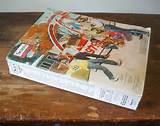 The pages made from pulp paper were much preferred to the glossy pages with color photos. But those glossy pages were also repurposed; some were placed under the kindling used to start fires in the kitchen and living room stoves.
The pages made from pulp paper were much preferred to the glossy pages with color photos. But those glossy pages were also repurposed; some were placed under the kindling used to start fires in the kitchen and living room stoves.
Now, kindling needs to be dry to catch fire quickly and burn as intended. One winter evening after returning at 30 below from visiting neighbors we found our house filled with smoke. Panic! Our first instinct was the house was on fire? Turns out, kindling had been cut outside from a woodpile covered in two feet of snow. The kindling got wet. Our mother had put some damp kindling into the hot oven so it would dry to start the fires the next morning. While we were away, it had burst into flame in the oven. Whew!
A few of our older neighbors were still using horses for most of their farm work, even to plow fields, haul seeders and harvesters, and pull hay mowers and rakes. The key summer assignments for our pair of heavy horses – Pat the black Percheron (we think) and Mike the gray Clydesdale (probably) – were in our hay meadow.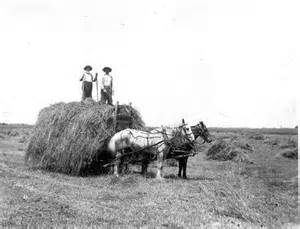
The ground in the hay meadow was too soft to support a tractor, so the big boys were pressed into service pulling our mower to cut the hay, and a big rake used to gather it into rows and then into piles. We loaded the hay by hand with pitch forks onto a flat wagon with side rails the horses pulled over to a hay stack, where the hay was then offloaded, again by hand. Yes, labor intensive.
Our clever Dad, always the inventor, created a rig for our tractor that worked much like today’s forklifts. Trouble was, he could use it only in the fall and winter when the ground in the pasture was firm enough to support our heavy iron-wheeled tractor.
Today, teams of heavy horses, also known as draught horses, are seen mostly at country fairs. Have a look at the harnesses on those magnificent beasts. As kids, none of us were strong enough to lift a harness off the ground, much less place it on one of those big handsome docile animals. Watching our father harness Pat and Mike was a sight to behold—requiring strength, knowledge and precision.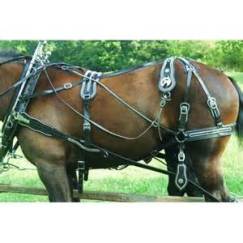
“You came from a farm, so you must ride horses,” I was asked often after we’d moved into town. The answer was “yes”, but I never told them the kind of horses we rode occasionally. Pat and Mike’s backs were so broad we could barely stretch our legs wide enough to straddle them. Riding one of them, with our feet tucked into the heavy leather harness while holding on for dear life, was like trying to ride a Greyhound bus bouncing over a rough winding road.
Education at the time was inexact, even haphazard. A new teacher took charge of our single classroom almost every year. Teachers were in short supply and thus especially difficult to attract to the backcountry.
One year, a young male teacher arrived fresh out of Normal School… it was a system invented by government to address an endemic shortage of pedagogues. Graduates from high school were given six weeks of training, then unleashed upon unsuspecting pupils and families as if they were real teachers. They became known as Six-Week Wonders. Ours devoted more of our time to field trips, sports days and building snow caves than to anything resembling an education. Mind you, he’s a convenient excuse for my life long numerical illiteracy.
Here again, a positive byproduct emerged. One of those field trips took us even farther into the wilderness, to a remote cabin occupied by a lone hermit. He looked scary at first to young children, with his bright shiny eyes, homemade leather cap perched atop long unruly brown hair, a scraggly gray beard, angular features and skinny physique. Modern vernacular would describe Anton Rumstead as a reclusive artisan who scratched out a subsistence living from hunting and trapping, and the sale of his brilliant miniature wildlife carvings.
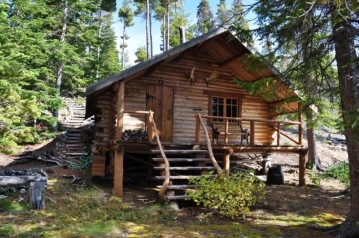 That early-June day had turned out to be unseasonably hot when we arrived at Mr. Rumstead’s log cabin. We found him sitting on the rough-hewn wood steps, shirtless and darkly tanned, carving away at a block of wood. Even our teacher seemed apprehensive at first. Then Mr. Rumstead looked up, gave us a warm smile and welcomed us to his home.
That early-June day had turned out to be unseasonably hot when we arrived at Mr. Rumstead’s log cabin. We found him sitting on the rough-hewn wood steps, shirtless and darkly tanned, carving away at a block of wood. Even our teacher seemed apprehensive at first. Then Mr. Rumstead looked up, gave us a warm smile and welcomed us to his home.
He patiently showed us some of the remarkable likenesses he’d carved and meticulously painted, including a moose complete with huge antlers, a family of wolves with young pups, and a black bear munching on a fish.
Later, he allowed us to cool off by swimming in a nearby pond surrounded by a stand of Aspen trees.
Needless to say, when you live in the wilderness, some medical procedures became do-it-yourself things. One day I fell and created a deep cut under my left eye. Blood flowed like sacramental wine on Palm Sunday. Before I knew it, I was on my back on the kitchen table, Dad holding me steady while our mother dipped thread and a sewing needle into a saucepan of boiling water. Our father was a remarkably calm man, except that day. Regardless, he stitched me up with a skill that could have drawn envy from a micro-surgeon, and did years later.
That knowledge came in handy a few years later. Our folks were away visiting neighbors one Sunday when I decided to practice woodcarving. 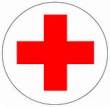 The plan was to carve a walking stick using Dad’s super sharp hunting knife. What had not been in the plan was a deep two-inch cut above my left knee.
The plan was to carve a walking stick using Dad’s super sharp hunting knife. What had not been in the plan was a deep two-inch cut above my left knee.
Now, attending to that cut soon was in third place among four reason to panic about my parents’ likely reaction when they got home. First place belonged to cutting a hole in my new pants, purchased with some of my parents’ limited financial resources. Second went to getting blood all over the left pant leg. Third was them having to repair said cut, and somewhere down in fourth place was the scolding I would get deservedly for borrowing Dad’s knife without permission.
Well, there’s nothing like a good role model. I found some adhesive tape and cotton balls and went to work. So yes, I patched up that cut, sloppily no doubt, hoping that by stopping the flow of blood I wouldn’t get into too much trouble at least for the cut. One vivid memory was wondering how long the strips of adhesive tape needed to be to pull together both sides of that cut. Remnants of that misadventure remain visible today.
Turns out I was correct to anticipate a stern scolding from my three other transgressions. My memory’s not clear whether I cleaned the wound… probably not. I didn’t understand then what antiseptic was all about. I did dab some iodine on the repair job.
There’s much to be said for today’s modern conveniences and advances in communication, science, medicine, health care, safety and the respect for differences, at least by some. Seventy years ago the Internet hadn’t even come close to entering the wildest dreams of sci-fi aficionados, much less the lexicon of the day. Today, we’d feel hard pressed to live without it.
So there you have it… there really was life before cell phones!
A lot of positives came along with having started life back then. We learned about solving challenges, about self-reliance, and about the difference between material things and values that really matter.
*
Back Story: Occasionally my childen and grandchildren have asked about what life was like on the remote farm where I grew up. This is a brief glimpse. Some of the stories mentioned above have been told in more detail elsewhere on this blog and in my published collection of short stories, Encounters With Life: Tales of Living, Loving & Laughter (http://amzn.com/162526271X)
*
“What Was It Like, Grandpa?” is Copyright © 2017 By James Osborne. All Rights Reserved
*
Image Credits: media-cache-ak0.pinimg.com; thumbs.picclick.com; livinghistoryfarms.files.wordpress.com; www.delsjourney.com.jpeg; http://www.nature.org/ourintiatives; http://www.hoard.com; workinghorsetack.com; allposters.com; http://www.thumbstime.com; keyword-suggestions.com
What an interesting life. It reminded me of the book Anne of Green Gables. I was born in 1943 in Queens, New York so I am a city girl we were poor but after reading about all the chores and out house I think I’ll take the city life. ☺☺
LikeLike
Thanks for your comments. Much appreciated. It took a while to adjust to urban life — still perfectly at home in the wilderness, though. 🙂
LikeLike
Fabulous story, captivating read. Kinda glad I missed some of those experiences, tho, glad I can enjoy the wilderness on my own terms for the most part, heh heh 😉
LikeLike
So glad you enjoyed the story, Marg. A chapter from your family’s checkered past that you missed. 🙂
LikeLike
That is one amazing history. To youngsters, those days seem so far away, but to those who can relive it in memory, it can seem so close. Recent events have prompted me to remember my early days in an industrial town in northern England.
So very different to your experiences – it was a country struggling to recover from the Second World War. An example: 14 years of wartime food rationing ended in 1954, when I was three years old.
There were ups and downs, but mostly I recall the warm family memories and events featuring friends long lost to me and whose names I struggle to remember.
Writing it down for posterity is a warm and noble project. Well done!
LikeLike
Thanks for re sending this. Sorry I missed it first time. It brought back many memories!! Well written. 😊
Sent from my iPhone
>
LikeLiked by 1 person
I only just got around to reading this properly. Great stories, so many memories. Fodder for fiction for years to come! 🙂
LikeLike
Excellent and similar to my upbringing except there were no trees, as our farm was on the prairies. We used coal to heat the cast iron stove. Raising cute little animals for human consumption turned me into a lifelong vegetarian.
LikeLiked by 1 person
Clearly you area a kind hearted soul. I must confess I’m still a carnivore, but my lovely wife is vegetarian. Go figure! 🙂
LikeLike